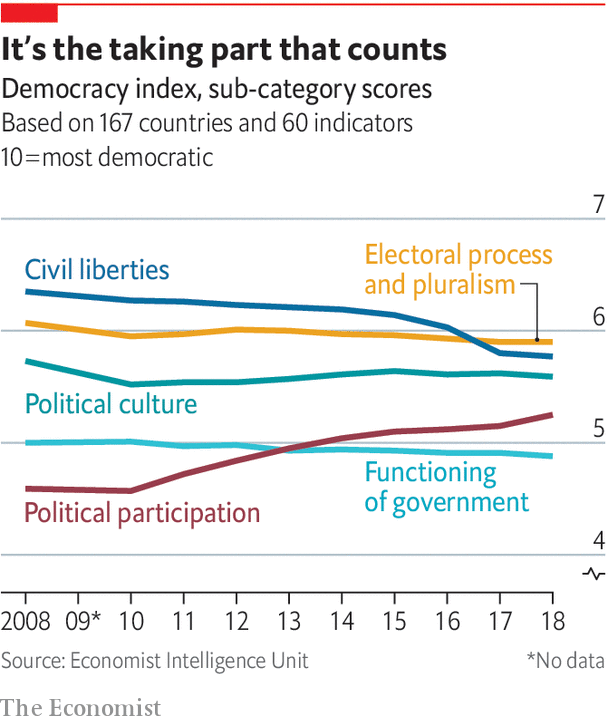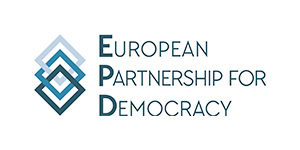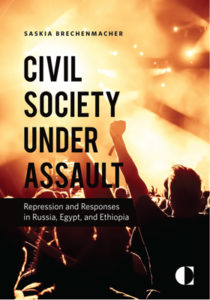
Credit: EIU
Democracy assistance is failing to adapt to the shifting dynamics of global politics evident in recent reports from such varied sources as Freedom House, the Varieties of Democracies project and The Economist Intelligence Unit’s 2018 Democracy Index (above), analysts suggest.
The European Union’s approach to democracy support in particular is not working with the grain of overarching political trends anymore; rather, it has to operate in a context of more active resistance against such efforts, according to Ken Godfrey, executive director of the European Partnership for Democracy, and Richard Youngs, an expert on EU foreign policy.
 The EU’s generic focus on civil-society support has intensified and the EU has increased its support to the European Endowment for Democracy (EED), which can operate in environments that prove complex with classic aid cooperation methods. But despite many policy improvements, in the round the evidence does not point to the EU taking a strong stand for democracy on any sort of consistent basis, notably its consensus-based preference for conflict-avoidance, they write for Carnegie Europe:
The EU’s generic focus on civil-society support has intensified and the EU has increased its support to the European Endowment for Democracy (EED), which can operate in environments that prove complex with classic aid cooperation methods. But despite many policy improvements, in the round the evidence does not point to the EU taking a strong stand for democracy on any sort of consistent basis, notably its consensus-based preference for conflict-avoidance, they write for Carnegie Europe:
While the positive justification for such gentle, cooperative approaches may sometimes be convincing, in many cases it is difficult to see how it generates any kind of reform traction. The cooperative strategy of democracy aid does not always serve as an alternative to punitive measures. In many of the cases where the EU has decided not to invoke democracy-related sanctions, it has also held back from funding political aid projects. EU support to civil society in Russia is a negligible €7 million ($7.8 million)—EIDHR [European Instrument for Democracy and Human Rights] funds are ten times oversubscribed in Russia, suggesting that Russian civil society does want EU support.
it is clear that EU approaches need a critical update. Despite the many improvements made, EU democracy support must still change more to embrace a wider variety of tactics, models, actors, and strategies, they contend, recommending ten action points, including:
1. STRENGTHEN THE LINK TO EU STRATEGIC AIMS
 Democracy is a founding value of the EU and a guiding principle for the union’s action in the international arena. But given current international events and the challenges outlined above, the EU needs to fashion support for democracy more specifically as a tool for European security self-interest—and not simply allude to a foundational value for the union itself. …The concept of resilience has arguably diverted attention from this imperative, but could be operationalized as a more clearly pro-democracy strategic concept in the future. The fact that this has not happened so far means that the EU Global Strategy acts to weaken rather than galvanize democracy support. …..
Democracy is a founding value of the EU and a guiding principle for the union’s action in the international arena. But given current international events and the challenges outlined above, the EU needs to fashion support for democracy more specifically as a tool for European security self-interest—and not simply allude to a foundational value for the union itself. …The concept of resilience has arguably diverted attention from this imperative, but could be operationalized as a more clearly pro-democracy strategic concept in the future. The fact that this has not happened so far means that the EU Global Strategy acts to weaken rather than galvanize democracy support. …..
2. REVAMP CIVIL-SOCIETY SUPPORT
 Several European donors recognize the need for a fundamental rethink in how civil-society organizations are supported and the need to encourage newer forms of activism. Global civil society is not the same as it was ten years ago, as new civic movements come to supplement traditional NGOs. Despite recent policy changes, European democracy support is struggling to keep pace with the emergence of new types of pro-democracy actor and emerging models of democratic accountability…..The union needs a dedicated initiative designed to influence mass protests. Citizens around the world today tend to protest more than join NGOs—but EU policy has yet to make this shift in the theory of political change to which it implicitly, if not explicitly, works. The EU therefore needs new policy and funding mechanisms to update its democracy support in this direction.
Several European donors recognize the need for a fundamental rethink in how civil-society organizations are supported and the need to encourage newer forms of activism. Global civil society is not the same as it was ten years ago, as new civic movements come to supplement traditional NGOs. Despite recent policy changes, European democracy support is struggling to keep pace with the emergence of new types of pro-democracy actor and emerging models of democratic accountability…..The union needs a dedicated initiative designed to influence mass protests. Citizens around the world today tend to protest more than join NGOs—but EU policy has yet to make this shift in the theory of political change to which it implicitly, if not explicitly, works. The EU therefore needs new policy and funding mechanisms to update its democracy support in this direction.
3. WORK WITH THOSE THAT RECEIVE LESS SUPPORT:
This applies to other spheres as well. The EU has done an impressive job in improving its ability to support smaller initiatives in recent years and should expand on this. Two areas merit further support:
- First, the current challenges to representative democracy around the world mean that the key institutions of representation, particularly party systems and legislatures, need support from the international community.
- Second, recent changes to the media sector and the increased use of social media mean that independent media, including investigative journalism, also need increased support from the international community. Where EU rules are restrictive, it might be necessary to channel more funds in the future through the EED, democracy-support organizations, or national donors that operate more flexible aid modalities…..RTWT







